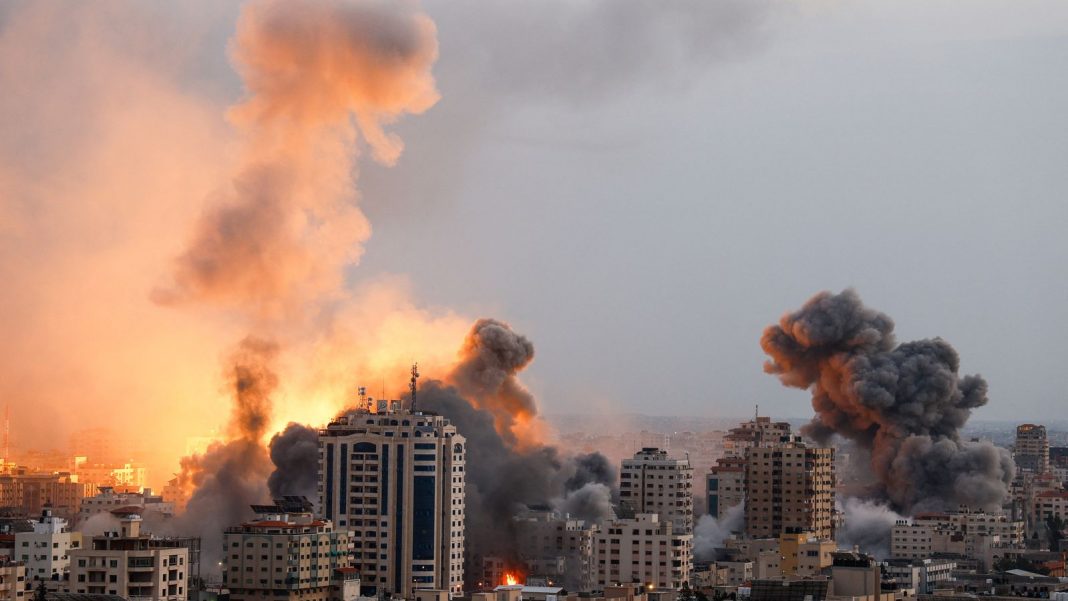The Gaza Strip refers to a narrow strip of land wedged between Israel and Egypt on the Mediterranean Sea. It forms the smaller of the two Palestinian territories – the other being the West Bank.
After Israel declared its statehood in 1948, Egypt controlled the Gaza Strip for nearly two decades.
Israel then gained control of the Gaza Strip and the West Bank after its victory in the 1967 Six-Day War against its Arab neighbours. For the next 38 years, it controlled the strip and enabled the construction of 21 Jewish settlements.
In 2005, under international and domestic pressure, Israel withdrew around 9,000 Israeli settlers and its military forces from the Gaza Strip, leaving the enclave to be governed by the internationally recognised Palestinian Authority, which also controlled parts of the occupied West Bank.
Israel-Gaza latest: Israel warns its offensive ‘won’t be clean’
Today, with over two million Palestinians living within roughly 140 square miles, it is “one of the world’s most densely populated territories”, according to Gisha, an Israeli non-governmental organisation.
Half of Palestinians living in the Gaza Strip are under the age of 19, but they have few to no prospects for socioeconomic growth and limited access to the outside world.
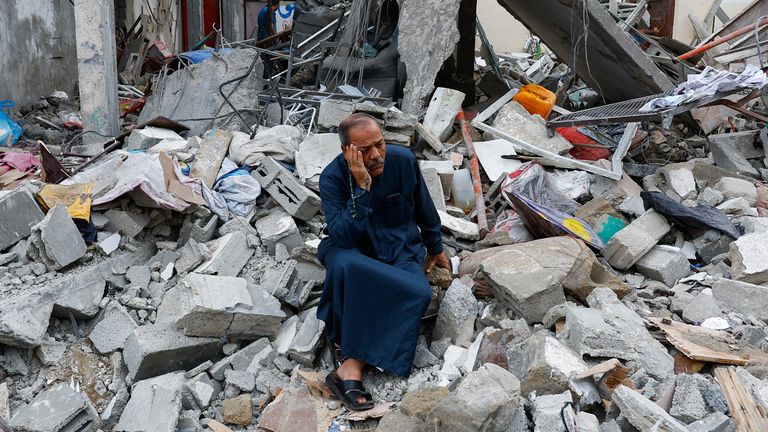
A Palestinian sits on the rubble of a building destroyed in Israeli strikes, in Rafah in the southern Gaza Strip
Who governs and who controls it?
Hamas, which has clashed repeatedly with the Palestinian leaders in the West Bank who negotiated the Oslo Peace Accords, currently governs the Gaza Strip. It took control in 2007 after it won elections there the year before. Since then, no elections have been held.
Despite pleas from the United Nations and human rights groups, Israel has maintained a land, air and sea blockade on the Gaza Strip since 2007 that has had a devastating effect on Palestinian civilians. Israel says the blockade, which gives it control of the Gaza Strip’s borders and is also enforced by Egypt, is necessary to protect Israeli citizens from Hamas.
The International Committee of the Red Cross considers the blockade illegal and says it violates the Geneva Convention, a charge Israeli officials deny. The UN, various human rights groups and legal scholars, citing the blockade, consider the Gaza Strip to still be under military occupation by Israel.
Read more:
Large number of tanks mass on border with Gaza
How Hamas misled Israel for months to pull off attack
Grandmother taken by Hamas ‘suffering every minute’
Mother fears for her life in Gaza as bombs crash nearby
Please use Chrome browser for a more accessible video player
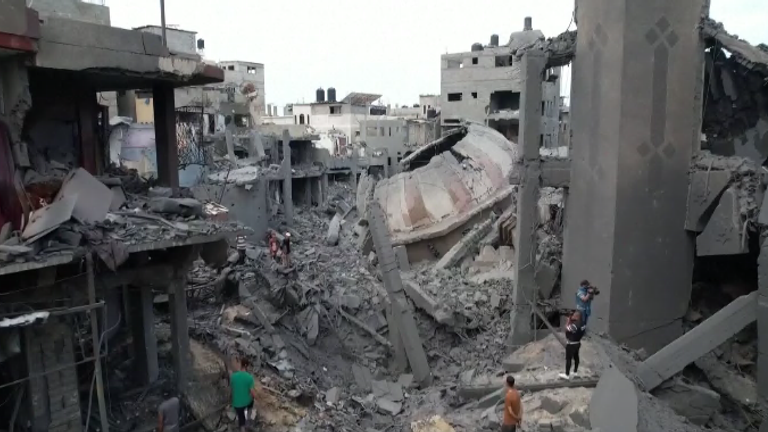
0:55
Drone shows scale of destruction in Gaza
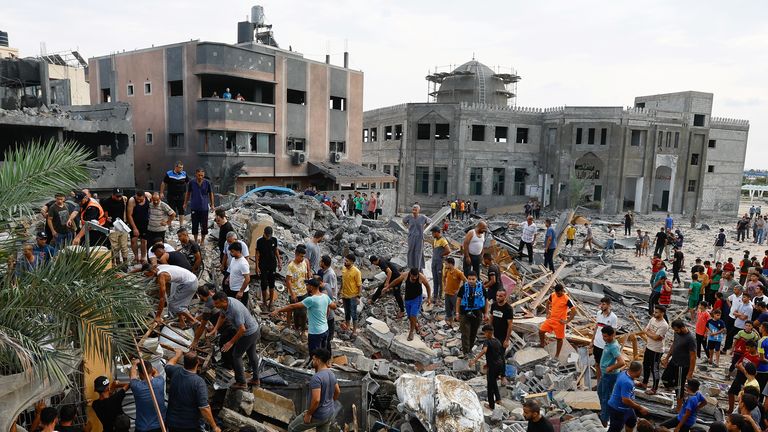
Palestinians walk among the rubble of a building destroyed in Israeli strikes, in the southern Gaza Strip
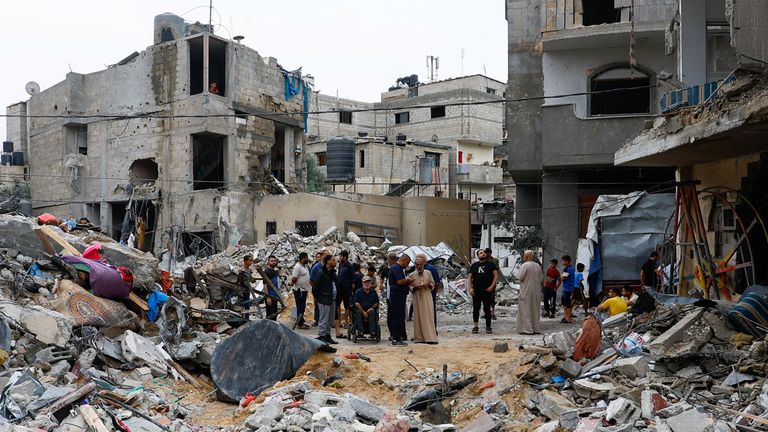
Palestinians inspect the buildings destroyed in Israeli strikes, in Rafah in the southern Gaza Strip
What is Hamas?
Hamas is one of the two major political parties in the Gaza Strip and the West Bank. Founded in 1987 during an uprising against Israel’s occupation of Gaza and the West Bank, the group was originally a branch of the Muslim Brotherhood, which favours Islamist principles – a belief that Islam should play a major role in political life.
Hamas or its military wing, the al Qassam brigades, are designated terrorists by Israel and most Western nations, including the UK, the US, Canada and the entirety of the European Union.
Other nations, however, see it as the legitimate administration in the territory.
These include Iran, which is one of the group’s major backers, and the Shia Islamist group Hezbollah, in Lebanon.
Hamas also provides social services for people in Gaza, such as education and medical care in hospitals.

Palestinian fighters from the armed wing of Hamas
Does it have the support of Palestinians?
Hamas says it is a freedom-fighting movement to free Palestinians from occupation and reclaim large parts of Israel. Its actions are divisive among Palestinians and those who support establishing a Palestinian state because of its use of violence.
A recent poll by the Palestinian Center for Policy and Survey Research reported that one-third of Palestinians found the internal and political split between the Palestinian Authority in the West Bank and Hamas in Gaza to be “the most damaging development that has happened since 1948”.
The same poll found that more than half of Palestinians living in the Gaza Strip and the West Bank would vote for Hamas over the Palestinian Authority.
The group’s popularity grew after a two-week conflict with Israel in 2021, with roughly 75% of those polled viewing Hamas as safeguarding the al Aqsa Mosque and other Muslim holy sites in East Jerusalem.
Please use Chrome browser for a more accessible video player
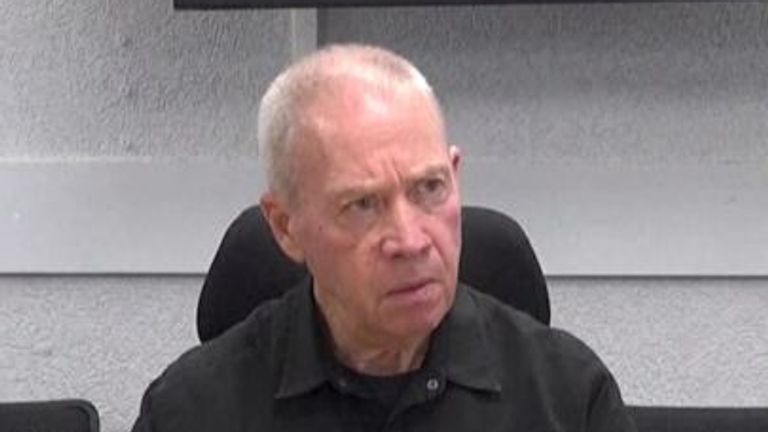
0:15
Israel imposes ‘complete siege’ of Gaza
Who funds it?
Hamas receives heavy backing from Iran, which contributes “funds, weapons, and training” to the militant group, according to the Council on Foreign Relations. Though Turkey insists it supports Hamas only politically, it has been accused of funding Hamas’s terrorism, including through funds diverted from Turkish government aid programmes.
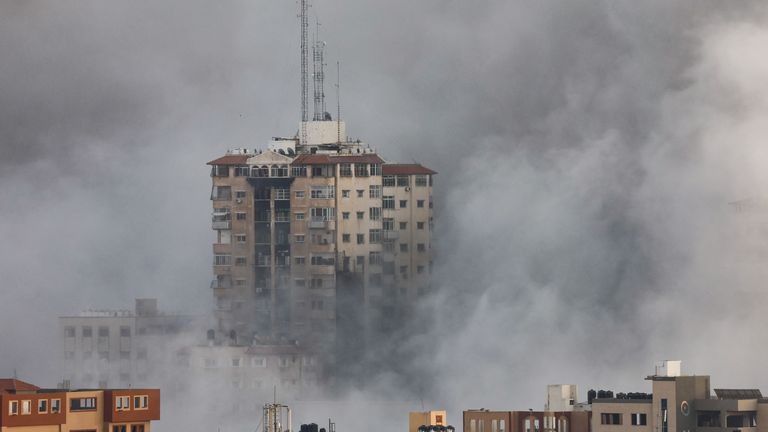
Smoke billows from a building after it was hit by Israeli strikes, in Gaza
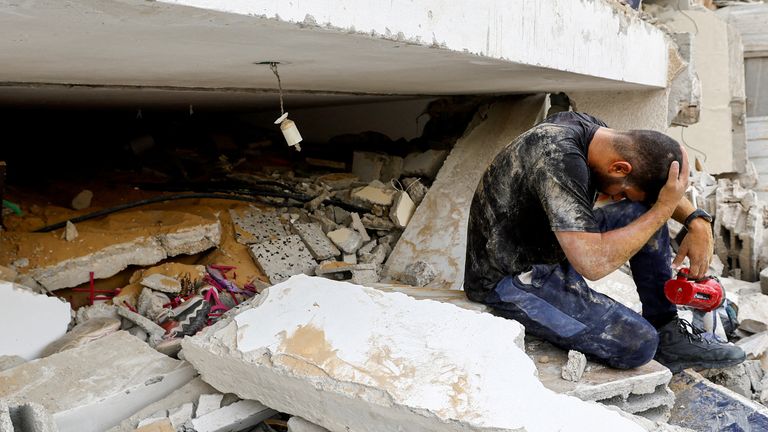
A rescuer works with others to remove Palestinian casualties from under the rubble of a house destroyed in Israeli strikes, in Rafah in the southern Gaza Strip
What is it like living in Gaza?
Before this conflict, Human Rights Watch likened conditions in the Gaza Strip to “an open air prison”, referring to the restriction of movement Israel enforces on Palestinians there. Israel prohibits Palestinians from entering or leaving the area “except in extremely rare cases, which include urgent, life-threatening medical conditions and a very short list of merchants”, according to B’Tselem, an Israeli human rights group.
Israelis, Jewish settlers and foreigners are not subject to those restrictions and are free to travel in and out of the Gaza Strip. Over the years, Israel has gradually closed land-border crossings from the Gaza Strip into Israel except for one – which is open only to Palestinians with Israeli-approved permits. Egypt sporadically closes its land-border crossing for months on end, which is often the only way people in the Gaza Strip can gain access to the rest of the world.
Please use Chrome browser for a more accessible video player
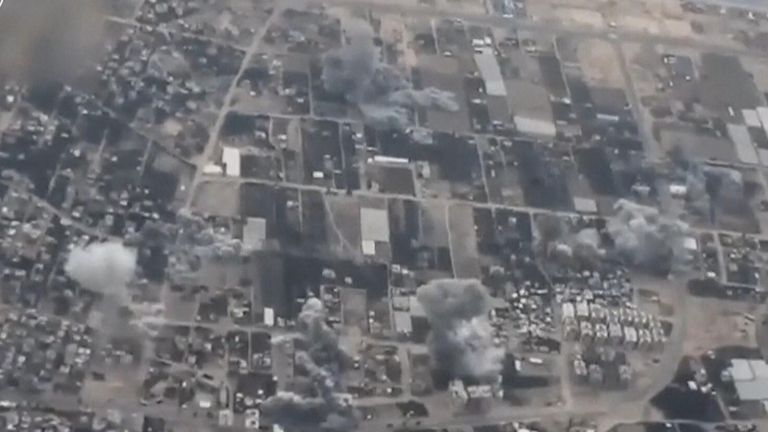
0:44
Israeli military strikes targets across Gaza
By limiting imports and nearly all exports, Israel’s 16-year blockade has driven the Gaza Strip’s economy to near-collapse, with unemployment rates above 40%, according to the World Bank. More than 65% of the population lives under the poverty line, according to the UN, with 63% of people deemed “food insecure” by the World Food Programme.
Little psychological support exists for a generation of children who are “living with the long-term psychological effects of constant exposure to violence”, according to a UN report, which described an uptick of mental health issues, including depression, among young people living in the Gaza Strip.
“The Gaza closure blocks talented, professional people, with much to give their society, from pursuing opportunities that people elsewhere take for granted,” Human Rights Watch said in a 2021 report. “Barring Palestinians in Gaza from moving freely within their homeland stunts lives and underscores the cruel reality of apartheid and persecution for millions of Palestinians.”


